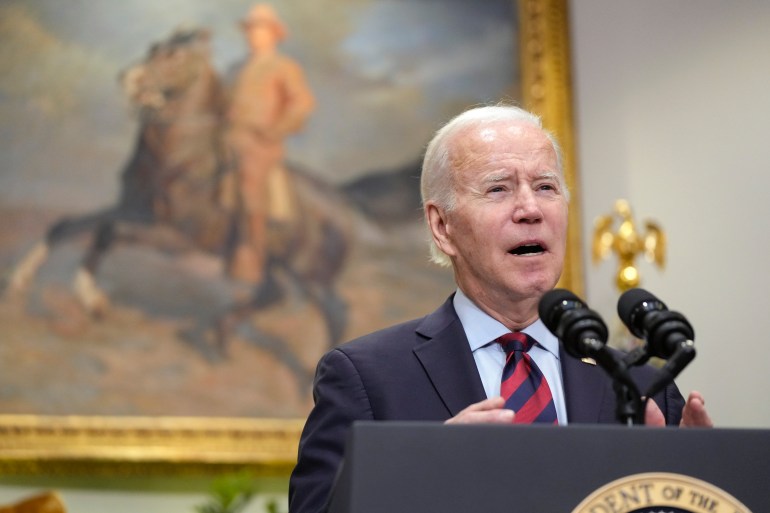United States President Joe Biden has signed into law a joint resolution ending a labour dispute between the country’s railroad companies and its unions, forcing both parties to reach a deal that would mean higher wages for workers.
The move halts a strike that was anticipated to start on December 9, as railroad workers push for better working conditions. Biden had said that a railroad strike would spell “real disaster” for the US economy, resulting in job losses for “as many as 765,000 Americans” within the first two weeks alone.
But in a bill-signing ceremony at the White House on Friday, Biden opened his remarks by vowing to continue the fight for one of the rail unions’ key demands: paid sick leave. An amendment that would have added seven days’ sick leave to the deal failed to pass the US Senate on Thursday.
“We still have more work to do, in my view, in terms of getting paid sick leave, not just for rail workers but for every worker in America,” Biden said. “That is a goal I had in the beginning, and I’m coming back at it.”
While the deal fails to guarantee paid sick leave, it does offer workers a 24-percent raise and $5,000 in bonuses retroactive to 2020, along with one additional day of paid leave.
The Biden administration helped reach the deal back in September, calling it “an important win for our economy and the American people”. But four of the 12 rail unions needed to approve the deal instead rejected it, with some pushing for a strike.

With railroad companies and unions at a standstill, the Biden administration exercised its powers under the 1926 Railway Labor Act to intervene in disputes that “threaten substantially to interrupt interstate commerce”.
This led to an outcry among rail unions, who felt their ability to negotiate was being curtailed.
“We firmly believe in the workers’ right to fight for their own best interests, as well as the best interests of their families,” SMART-TD, one of the unions representing rail workers, said in a statement opposing plans for Congress to intervene in the deal.
Congress moved swiftly to avert the anticipated rail strike, which would have frozen nearly 30 percent of US cargo by freight and cost the economy an estimated $2bn per day.
On Wednesday, the US House of Representatives voted 290 to 137 to impose the rail deal on unions and companies. It also passed an amendment to add sick leave to the deal, albeit by a more slender margin, 221 to 207.
That sent the deal to the Senate, which likewise passed the rail deal 80 to 15. But the sick leave amendment failed to clear the 60-vote threshold needed to avoid a filibuster, with the majority of Republicans and West Virginia Democrat Joe Manchin voting against it.
In the wake of the Senate vote, unions like the Brotherhood of Railroad Signalmen, which represents over 10,000 railroad workers, expressed disappointment.
“What took place in the United States Senate today is a symptom, and further illustration, of a larger issue in our country. Almost every elected member of Congress campaigns on being ‘for the working class’. The actions of many today demonstrated they are for the corporate class,” the Brotherhood said in a statement.
The deal signed on Friday is expected to affect some 115,000 rail workers across the United States.
In his speech on Friday, Biden acknowledged, “This was a tough vote for members of both parties.” But he underscored that imposing the deal “was the right thing to do at the moment”, thanking Congress for preventing “economic catastrophe at a very bad time on the calendar”.
“Our nation’s rail system is literally the backbone of our supply chain, as you well know, and so much of what we rely on is delivered on rail, from clean water to food and gas and every other good,” Biden said.
“Communities could have lost access to chemicals to ensure clean drinking water. Farms and ranches across the country would have been unable to feed their livestock. Thanks to the bill Congress passed and what I’m about to sign, we’ve spared the country that catastrophe.”
As he left the signing ceremony, Biden told reporters he was headed to Boston, where he planned to attend a fundraiser for Raphael Warnock, the Democratic incumbent for Georgia’s Senate seat in the run-off race on December 6.


